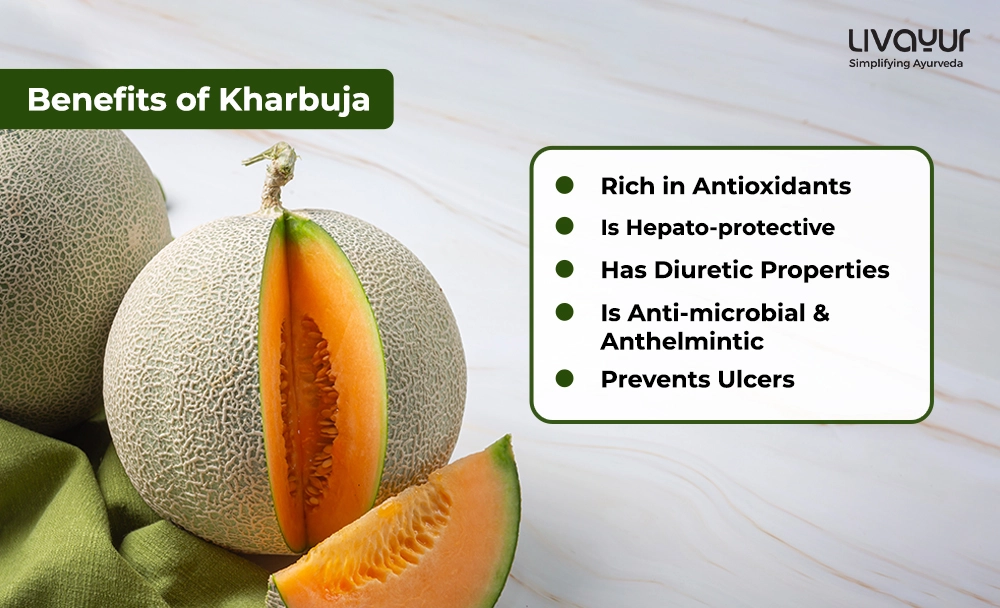This article is reviewed by an expert

Have you ever eaten Kharbuja? Did you know that this summer fruit tastes great and has numerous health benefits?
Kharbuja, also known as muskmelon, is native to India and Africa and a popular fruit in tropical and subtropical regions. It belongs to the Cucurbitaceae family, including squash, pumpkins, cucumbers, watermelons, and gourds. [1] Rich in several nutrients, Kharbuja offers numerous health benefits to the body. This article will explore the various Kharbuja benefits and other important facts about Kharbuja. Read on:
Different Names of Kharbuja [1]
Kharbuja is known by several other names, as listed below:
Other English Names: Cantaloupe, Sweet Melon, Mush Melon, Persian Melon, Rock Melon
Other Indian Local Names: Kharbooj (Hindi), Kharbooja (Telugu), Kharbuj (Marathi), Kharamuja (Bengali), Teti (Gujarati), Kekkarikke Hannu (Kannada), Thalkumbalam (Malayalam), Keerini Pazham (Tamil)
Nutritional Value of Kharbuja
Kharbuja, also known as muskmelon, is delicious and packed with essential nutrients. The Kharbuja nutrition values are available in the table below:
| Nutrients | Values Per 100 grams |
| Energy | 34 Kcal |
| Water | 90.2g |
| Fats | 0.19g |
| Proteins | 0.84g |
| Carbohydrates | 8.16g |
| Fiber | 0.9g |
| Total Sugars | 7.86g |
| Calcium | 9mg |
| Potassium | 267mg |
| Sodium | 16mg |
| Magnesium | 12mg |
| Manganese | 0.041mg |
| Iron | 0.21mg |
| Copper | 0.041mg |
| Phosphorous | 15mg |
| Zinc | 0.18mg |
| Vitamin C | 36.7mg |
| Riboflavin | 0.019mg |
| Niacin | 0.734mg |
| Thiamine | 0.041mg |
| Vitamin B6 | 0.072mg |
Source: USDA
Benefits of Kharbuja
1. Has Analgesic and Anti-inflammatory Effects [1] [2]
The methanolic extract of Kharbuja and Kharbuja seeds possesses potent analgesic properties. Kharbuja also inhibits the leukocyte influx and diminishes LTB4 levels, thereby producing anti-inflammatory effects..
2. Rich in Antioxidants [1]
The methanolic extract of muskmelon or Kharbuja has shown DPPH and hydroxyl radicals scavenging activity in many studies. The antioxidant capacity of the fruit protects the cells of your body against the damage caused by oxidative stress, the main culprit behind many chronic diseases like heart diseases, cancer, and neurodegenerative disorders. In addition, the leaf and stem extracts of muskmelon also exhibit potent antioxidant activity.
3. Is Hepato-protective [1] [2]
By improving hepatic function and reducing lipid peroxidation, muskmelon exhibits protective effects on the liver, thereby preventing and treating several liver diseases.
4. Has Diuretic Properties [1] [2]
According to studies, the ether extract of the muskmelon and its seeds can significantly increase the urinary volume and chloride content. As a result, Kharbuja also helps eliminate waste products and toxins from the body.
5. Is Anti-microbial & Anthelmintic [1] [2]
In several studies, the n-hexane and methanolic extracts of the Kharbuja seeds have shown potent antimicrobial and anthelmintic activity. As such, muskmelon’s seed extracts can help combat harmful microorganisms and intestinal parasites, improve gastrointestinal health, and reduce infection risk.
6. Acts as an Immuno-modulator
In a study, combining SOD-rich melon extract and wheat gliadin significantly increased the production of type 1 helper T lymphocytes (Th1) and the expression of IFN-gamma and IL-12. This helps regulate immune responses and support a balanced immune system to fight diseases and infections.
7. Prevents Ulcers [1] [2]
Certain compounds present in Kharbuja help prevent ulcers. Therefore, the fruit can be used to prevent and heal ulcers while promoting overall digestive health.
8. Has Anti-Cancer Effects [1]
Kharbuja comes with anti-cancer effects. This helps muskmelons or Kharbuja to inhibit specific cellular pathways involved in leukemia, a specific type of cancer affecting the blood-forming tissues..
9. Treats Hypothyroidism [3] [2]
Muskmelon or Kharbuja can potentially support thyroid function and help manage the associated symptoms in patients with hypothyroidism.
10. Manages Diabetes [1]
Studies show that the fruit peel extracts of Kharbuja can reverse the CCT-diet-induced increase in the levels of tissue lipid peroxidation, serum lipids, glucose, and creatinine kinase-MB. This may help regulate blood sugar levels and improve overall glycemic control in people with diabetes.
How To Consume Kharbuja?
- Freshly Diced Fruit or Juice: The most common way to consume muskmelon or Kharbuja is by eating it fresh and ripe. Alternatively, you can also blend the fruit and make it into a juice or smoothie.
- Sherbet: Kharbuja Sherbet is another popular beverage with this fruit. All you must do is blend it with sugar syrup, water, and a hint of rose water or cardamom.
- In Desserts: You can also prepare desserts from muskmelon like ice-creams or halwa.
Side effects Of Kharbuja
Kharbuja rarely produces any sort of side effect. The fruit is considered safe in most cases. However, overconsumption of the Kharbuja fruit may result in the following side effects for some people:
- Blood Sugar Spikes: Excessive consumption of Kharbuja may lead to sudden blood sugar spikes for people with diabetes.
- Weight Gain: The fruit is high in natural sugars; thus, overconsumption of the fruit may cause you to lose weight.
- Gas & Loose Motion: For some people, Kharbuja consumption may lead to gas formation, stomach cramps, and loose bowel. [4]
FAQs
1. Is Kharbuja a summer fruit?
Yes, Kharbuja fruit is a beneficial summer fruit. It can beat the scorching summer heat by having a cooling impact on your body.
2. Can Kharbuja worsen the cough and cold symptoms?
The fruit has a cold or sita potency. Therefore, avoiding this fruit when you suffer from cough and cold is best.
3. Can Kharbuja be eaten on an empty stomach?
It is best to avoid eating Kharbuja on an empty stomach as consumption of the fruit on an empty stomach may cause indigestion and uneasiness throughout the day.
4. Can Kharbuja seeds be consumed?
Yes, Kharbuja seeds can be consumed. There are many Kharbuja seeds benefits. The seeds are packed with potassium and other vital minerals and can definitely be added to your diet.
5. Who should avoid Kharbuja?
Those with a sensitive stomach must avoid the fruit as it may cause gas.
Conclusion
Kharbuja, or muskmelon, is a delightful fruit with a plethora of Kharbuja benefits for your health. The various properties of muskmelon, such as analgesic, anti-inflammatory, antioxidant, and hepato-protective, can help promote overall well-being and combat various ailments. Rich in vitamins A, B, and C and niacin, Kharbuja is an excellent addition to a healthy diet.
Disclaimer
This article is written from a health and lifestyle perspective. It is not a substitute for medical advice.
References
- Musk melon is eat-must melon
- Comprehensive Overview of Cucumis melo
- Protective role of Mangifera indica, Cucumis melo and Citrullus vulgaris peel extracts in chemically induced hypothyroidism
- Two Outbreaks of Foodborne Gastrointestinal Infection Linked to Consumption of Imported Melons, United Kingdom, March to August 2021


















